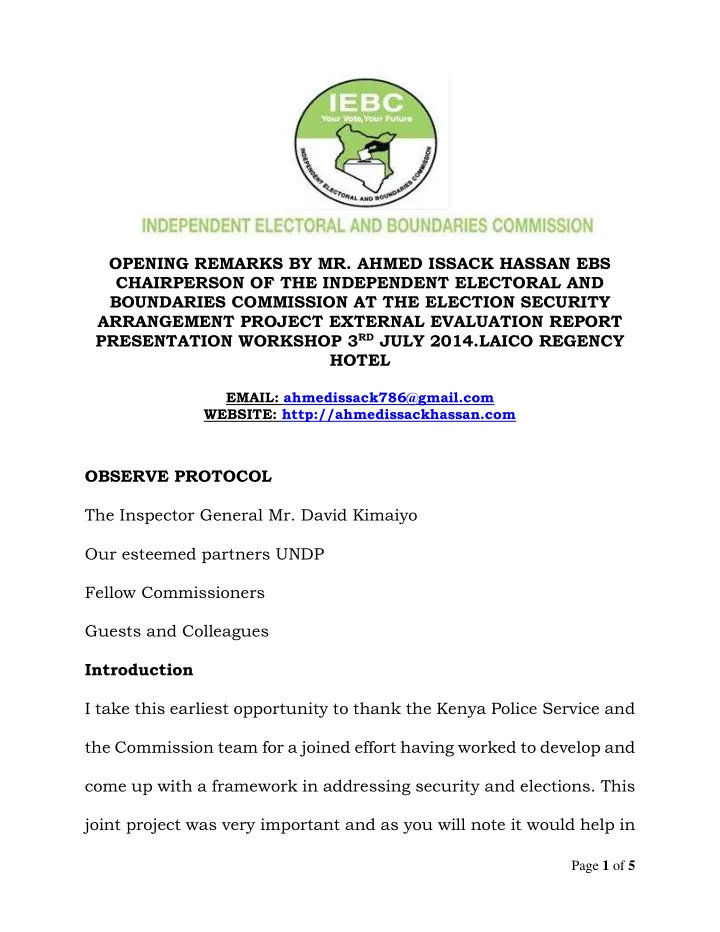

OPENING REMARKS BY MR. AHMED ISSACK HASSAN EBS CHAIRPERSON OF THE INDEPENDENT ELECTORAL AND BOUNDARIES COMMISSION AT THE ELECTION SECURITY ARRANGEMENT PROJECT EXTERNAL EVALUATION REPORT PRESENTATION WORKSHOP 3 RD JULY 2014.LAICO REGENCY HOTEL EMAIL: ahmedissack786@gmail.com WEBSITE: http://ahmedissackhassan.com OBSERVE PROTOCOL The Inspector General Mr. David Kimaiyo Our esteemed partners UNDP Fellow Commissioners Guests and Colleagues Introduction I take this earliest opportunity to thank the Kenya Police Service and the Commission team for a joined effort having worked to develop and come up with a framework in addressing security and elections. This joint project was very important and as you will note it would help in Page 1 of 5
identifying and putting in place election measures and a management framework during, before and after the General March 4 th General Election. Ladies and Gentlemen one of the hall marks of a well-managed election is the provision of security for all voters, election official and materials. Kenya has had a history of electoral related violence since the introduction of the multiparty politics, the worst being the 2007 -2008 violence. It has been argued that the commencement of violent hostilities witnessed at the time was a typical reflection of existing social cleavages, a weak institutional and legal framework of the electoral system. Genesis of ESAP In 2011/21, IEBC pilot tested the Electoral Risks Management Tool (ERMT) developed by International IDEA. The data collected and analyzed showed the likelihood of electoral related violence during the general election was very high, hence the conceptualization Elections Security Arrangement Project (ESAP). The overall goal of the ESAP a joint project of the Kenya Police Service and the Commission was to address gaps in the management of security before, during and after the elections. Page 2 of 5
Key Activities Already Implemented The project document had several activities lined up, however due to delay in starting the implementation, training and development of reference materials for the police personnel were prioritized as key activities before the March 4 th 2013 general elections. The other priority was development, installation and implementation of a digital events and processions register for the police. Trainings were conducted at four levels; i. National police training Thirty Four (34) senior police officers from Kenya Police and Administration Police appointed by the Inspector General and 17 IEBC Regional Elections Coordinators (RECs) were trained. ii. Regional trainings Regional trainings were also conducted in all regions. This brought together the Officers Commanding Police Divisions (OCPDs), District Administration Police Commanders (DAPCs) and Constituency Election Coordinators (CECs) in each region. Page 3 of 5
iii. Divisional Level Training This level of training brought together Officers Commanding Stations (OCSs), Administration Police in charge of Administration Police Posts and Administration Police Administrators. iv. Station Level Training At this level all OCS and APCs were expected to train their officers routinely. Every week Officers commanding this stations would have a day where they induct police officers on any emerging elections- security related issues . In addition Ladies and Gentlemen, it would be worth to note that there was the development, production and distribution of the Elections Handbook for security personnel and a pocket size security guide (Role Card). The handbook outlined the legal basis and the role of the police during the electoral period while the pocket size guide is a summary of important information related to security during the election period. Over 100,000 copies of the Handbook and Role Cards were Page 4 of 5
produced and distributed to Kenya Police, Administration Police and formations. Conclusion Joint planning and training between the Police and the IEBC staff on election security was the first of its kind in Kenya. This has promoted socialization and trust between and among the two institutions’ officers and increased their coordinated action. With this arrangement, it was possible to effectively coordinate security delivery during the elections. Finally, it is clear that due to the short period of implementation, many of the activities lined in the project were not implemented. As we prepare for the 2017 General elections and considering that Electoral security is not an event, it is my appeal that our development partners support IEBC in the Institutionalization of this important component through the electoral cycle. THANK YOU Page 5 of 5
Recommend
More recommend